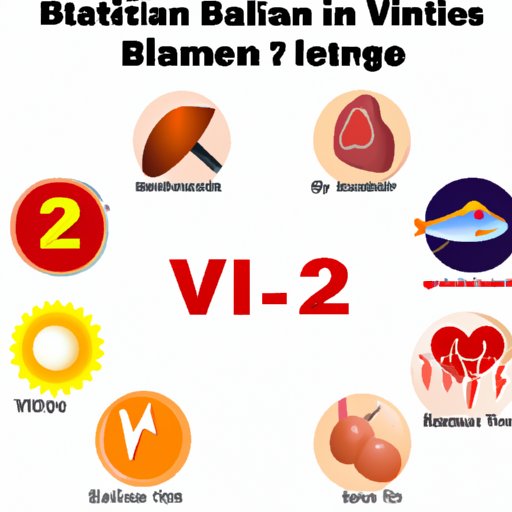
I. Introduction
Vitamin B12 is an essential nutrient that plays a crucial role in the functioning of the nervous system and the production of red blood cells. Low vitamin B12 levels can lead to a variety of health problems, including anemia and cognitive impairment. In this article, we’ll explore the various causes of low vitamin B12 levels and their implications for overall health.
II. Causes of Low Vitamin B12: Understanding the Basics
Low vitamin B12 levels, or vitamin B12 deficiency, occurs when the body doesn’t have enough of this essential nutrient to function properly. This can happen for a variety of reasons, including poor diet, genetic factors, and medication use.
A. Definition of Low Vitamin B12 Levels
Vitamin B12 deficiency is defined as having a blood concentration of vitamin B12 below 200 pg/mL. However, some people may experience symptoms of deficiency even if their blood levels are above this threshold.
B. Understanding the Causes of Low Vitamin B12
As mentioned, low vitamin B12 can be caused by a number of factors. Let’s explore some of the most common causes.
III. The Role of Diet in Vitamin B12 Deficiency
Diet is one of the most common causes of low vitamin B12 levels, particularly for people who follow certain dietary restrictions.
A. Overview of Vitamin B12 Rich Foods
Animal products, such as meat, dairy, and eggs, are the primary dietary sources of vitamin B12. Some fortified cereals and plant-based milks may also contain B12, but it’s important to read labels carefully to ensure adequate intake.
B. Dietary Restrictions and Low Vitamin B12
Strict vegetarians and vegans may be at increased risk of vitamin B12 deficiency, as they don’t consume animal products that contain the nutrient. However, plant-based sources of vitamin B12 may be available in the form of fortified foods or supplements.
C. Veganism and Low Vitamin B12
Vegans in particular may be at greater risk of vitamin B12 deficiency, as plant-based sources of B12 are not as easily absorbed as animal-based sources. Taking a B12 supplement or consuming fortified plant-based foods can help prevent deficiency in those following a vegan diet.
IV. Genetic Predisposition: A Factor in Low Vitamin B12 Levels
Some people have genetic factors that affect how their body absorbs and utilizes vitamin B12. These genetic factors can lead to vitamin B12 deficiency in some cases.
A. Overview of Genetic Factors that Affect Vitamin B12 Absorption
Some genetic conditions can affect the body’s ability to absorb vitamin B12 from food. Examples include pernicious anemia and celiac disease.
B. Evaluation and Diagnosis of Genetic Factors
If you have a family history of vitamin B12 deficiency or a genetic condition that may affect absorption, your doctor may recommend testing to evaluate your vitamin B12 status and genetic makeup. Treatment may involve vitamin B12 supplementation or other interventions as needed.
V. Anemia and Vitamin B12 Deficiency: How They Are Connected
Anemia is a condition that occurs when there are not enough red blood cells or hemoglobin in the body to carry oxygen to the cells. Low vitamin B12 levels can contribute to anemia, and may be a cause of anemia in some cases.
A. Overview of Anemia and its Causes
Anemia can be caused by a variety of factors, including low iron levels, chronic disease, and genetic conditions. However, vitamin B12 deficiency can also contribute to the development of anemia.
B. Connection between Anemia and Low Vitamin B12 Levels
Vitamin B12 helps produce red blood cells, which are necessary for carrying oxygen to the cells in the body. Without enough vitamin B12, the body may produce fewer red blood cells, leading to anemia.
C. Symptoms of Anemia and Low Vitamin B12
Symptoms of anemia and low vitamin B12 can include fatigue, weakness, and shortness of breath. If you experience these symptoms, it’s important to see a doctor for evaluation and treatment.
VI. Medications and Low Vitamin B12 Levels
Certain medications can also contribute to vitamin B12 deficiency, either by interfering with absorption or by depleting the body’s stores of the nutrient over time.
A. Overview of Medications that Deplete Vitamin B12
Some medications that may contribute to vitamin B12 deficiency include metformin, proton pump inhibitors (PPIs), and H2 blockers. These medications can interfere with the body’s ability to absorb and use vitamin B12.
B. Evaluation and Diagnosis for Medication-Induced Vitamin B12 Deficiency
If you’re taking a medication that may contribute to vitamin B12 deficiency, talk to your doctor about monitoring your vitamin B12 levels and potentially supplementing as needed.
VII. Age-related Decline in Vitamin B12: Reasons and Symptoms
As we age, our bodies may become less able to absorb and utilize vitamin B12. This can contribute to age-related vitamin B12 deficiency and its associated symptoms.
A. Overview of Age-related Vitamin B12 Deficiency
As we age, the stomach lining may become thinner, which can interfere with the body’s ability to absorb vitamin B12. Additionally, some older adults may not consume enough vitamin B12 in their diets, leading to deficiency.
B. Symptoms of Age-related Vitamin B12 Deficiency
Signs of age-related vitamin B12 deficiency can include fatigue, weakness, and cognitive decline. Older adults may benefit from regular monitoring of their vitamin B12 levels and potentially supplementing as needed.

VIII. Lifestyle Factors that Affect Vitamin B12 Absorption
Some lifestyle factors can affect how the body absorbs and uses vitamin B12. These factors include smoking, alcohol consumption, and exercise habits.
A. Overview of Lifestyle Factors that Affect Vitamin B12 Absorption
Smoking, for example, can interfere with the body’s ability to absorb vitamin B12. Heavy alcohol consumption can also contribute to vitamin B12 deficiency. On the other hand, regular exercise may improve the body’s ability to utilize vitamin B12.
B. Smoking and Alcohol Consumption
If you smoke or consume alcohol heavily, it’s important to talk to your doctor about potentially supplementing with vitamin B12 to prevent deficiency.
C. Exercise and Vitamin B12 Absorption
Regular exercise, on the other hand, may help improve vitamin B12 absorption and utilization. If you’re looking to improve your vitamin B12 status, incorporating regular physical activity into your routine may be helpful.
IX. Conclusion
In conclusion, low vitamin B12 levels can have a variety of causes, from poor diet to genetic factors to medication use. If you’re experiencing symptoms of vitamin B12 deficiency, talk to your doctor about evaluation and potential treatment options. Incorporating vitamin B12-rich foods into your diet, along with potentially supplementing as needed, can help maintain optimal vitamin B12 levels and promote overall health.
A. Recap of the Causes of Low Vitamin B12 Levels
Dietary restrictions, genetic factors, medication use, age-related decline, and lifestyle factors can all contribute to low vitamin B12 levels.
B. Steps for Preventing and Treating Low Vitamin B12
Preventing and treating low vitamin B12 levels may involve incorporating vitamin B12-rich foods into your diet, taking supplements as needed, and making lifestyle changes that promote optimal absorption and utilization of the nutrient.
C. Final Thoughts and Tips for Maintaining Optimal Vitamin B12 Levels
If you’re concerned about your vitamin B12 status, talk to your doctor about evaluation and treatment options. Additionally, be sure to incorporate a variety of vitamin B12-rich foods into your diet, and make lifestyle choices that promote optimal vitamin B12 absorption and utilization.




